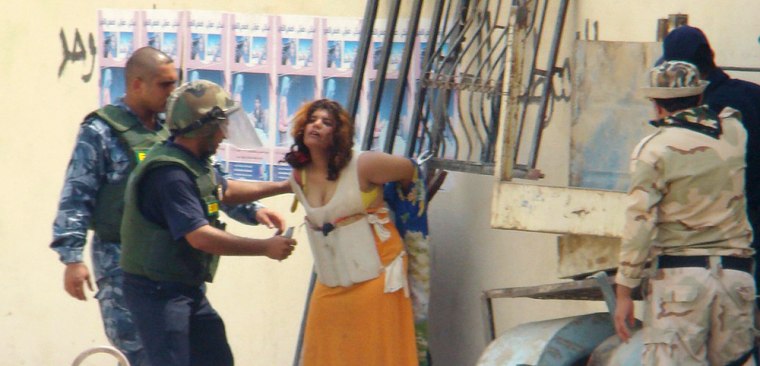In video footage released by Iraqi police, a teenage girl with an explosives vest tightly strapped to her body is seen handcuffed to a metal grid, her head repeatedly falling forward as several policemen huddle around her.
After several minutes, the officers lift her flowered robe, remove the white vest hidden underneath and then take her for questioning, videotaping her in the presence of reporters. They prod her to confess to plans to stage a suicide attack, but she denies the allegation.
The arrest of the girl, who gave her first name as Rania, heightened concern about a rise in suicide bombings by women in Iraq. The number of female bombers has more than tripled, from eight in 2007 to 29 this year, according to U.S. military officials.
That compares with a total of four in 2005 and 2006, according to the military. On Aug. 14, a woman suicide bomber struck a group of Shiite pilgrims south of Baghdad, killing at least 17 people and wounding dozens of others.
Police in Baqouba, where the girl was caught Sunday, said she told them she was fitted with the explosives by female relatives of her husband, whom she married five months ago. One police official alleged that some in the girl's family had links to the al-Qaida in Iraq terror network.
Police making a point
In displaying the dazed teenager — who says she was born in 1993, which would make her 14 or 15 — police wanted to deal another blow to the terror network's brutal reputation, officials said.
Police wanted to "show the desperate level al-Qaida has reached, with members of one family driving each other to death," said Ibrahim Bajilan, head of the provincial council in the Diyala province, of which Baqouba is the capital.
In publicizing the details of the case, police may also be trying to demonstrate they're effective in fighting the insurgents and to turn more Iraqis against the militants, said John Pike, a defense analyst and director of GlobalSecurity.org.
U.S. and Iraqi forces have struggled for years to contain Sunni insurgents in Diyala. The province has been the scene of much of the recent violence in Iraq, even as the rest of the country witnessed a significant drop in attacks.
With women bombers on the rise, the U.S. has stepped up efforts to recruit and train policewomen to search women at checkpoints and entrances to public buildings.
Many Iraqi women wear long robes, ideal for covering bulky suicide vests, and Iraqi policemen hesitate to pat them down at checkpoints because of cultural taboos.
33 pounds of explosives
The circumstances of the girl's arrest remained unclear. U.S. officials said she turned herself in after being hooked to the explosives against her will. Local police said she was caught by a police patrol after arousing suspicion while walking in downtown Baqouba.
The video begins with Rania standing in a street, both hands cuffed to a metal grid attached to a wall behind her. A police officer is later heard saying she apparently had been drugged.
For several minutes, officers surround her, speaking among themselves. One opens the robe in the front, and shouts out to his colleagues, apparently to confirm he spotted a vest.
One officer pulls out what appears to be a wire before removing the vest, and she is left standing in a sleeveless, ankle-long orange undergarment.
Police later said the vest was packed with 33 pounds of explosives. A police photo showed it had six compartments, including two stuffed with what looked like tubes and four holding packages covered in cling-wrap.
The next scene shows the girl in an office, wrapped in a black cloak, her dyed brown hair disheveled, as she is questioned by several officers. The journalists invited to attend are not shown.
Rare glimpse
Her exchange with the policemen offered a rare glimpse at a teenager allegedly recruited by insurgents in what the U.S. military has warned is a growing trend. However, it was not clear to what extent her answers were given out of fear and influenced by the presence of reporters.
She insisted at first she did not know the women who gave her the vest.
"I swear to Allah that I do not know them. They were strangers," she is heard saying. However, when pressed whether she knew the woman who put the vest on her, she replied: "Yes."
Police asked if she intended to blow herself up. "No, no, they put it on me and told me to take it off at home," she said. "They did not tell me to explode myself."
Reporters attended part of another interrogation session Monday, in which the girl told police that the explosives were strapped to her by female relatives of her husband. She told police that her husband was unaware she was given the explosives.
Contradicting her previous testimony, she said she was shown the vest's two detonators and told to press the second button if the first one failed to set off the bomb.
Rania's mother was also interrogated and told police she was unaware of the alleged plot, adding that her husband was missing.
Earlier Monday, an Iraqi police officer said the girl's family was known for supporting al-Qaida in Iraq and that her father had carried out a suicide bombing.
The officer, who spoke on condition of anonymity because he was not authorized to release the information, also said a relative is suspected of having recruited her.
The officer said that on Sunday, the girl led police back to where she was given the explosives and that they found a second bomb belt in an empty apartment.
U.S. commanders believe al-Qaida in Iraq is increasingly seeking to exploit women unable to deal with the grief of losing husbands, children and others to the violence.
